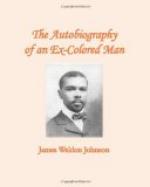John Brown was a jet-black man of medium size, with a strikingly intelligent head and face, and a voice like an organ peal. He preached each night after several lesser lights had successively held the pulpit during an hour or so. As far as subject-matter is concerned, all of the sermons were alike: each began with the fall of man, ran through various trials and tribulations of the Hebrew children, on to the redemption by Christ, and ended with a fervid picture of the judgment day and the fate of the damned. But John Brown possessed magnetism and an imagination so free and daring that he was able to carry through what the other preachers would not attempt. He knew all the arts and tricks of oratory, the modulation of the voice to almost a whisper, the pause for effect, the rise through light, rapid-fire sentences to the terrific, thundering outburst of an electrifying climax. In addition, he had the intuition of a born theatrical manager. Night after night this man held me fascinated. He convinced me that, after all, eloquence consists more in the manner of saying than in what is said. It is largely a matter of tone pictures.
The most striking example of John Brown’s magnetism and imagination was his “heavenly march”; I shall never forget how it impressed me when I heard it. He opened his sermon in the usual way; then, proclaiming to his listeners that he was going to take them on the heavenly march, he seized the Bible under his arm and began to pace up and down the pulpit platform. The congregation immediately began with their feet a tramp, tramp, tramp, in time with the preacher’s march in the pulpit, all the while singing in an undertone a hymn about marching to Zion. Suddenly he cried: “Halt!” Every foot stopped with the precision of a company of well-drilled soldiers, and the singing ceased. The morning star had been reached. Here the preacher described the beauties of that celestial body. Then the march, the tramp, tramp, tramp, and the singing were again taken up. Another “Halt!” They had reached the evening star. And so on, past the sun and moon—the intensity of religious emotion all the time increasing—along the milky way, on up to the gates of heaven. Here the halt was longer, and the preacher described at length the gates and walls of the New Jerusalem. Then he took his hearers through the pearly gates, along the golden streets, pointing out the glories of the city, pausing occasionally to greet some patriarchal members of the church, well-known to most of his listeners in life, who had had “the tears wiped from their eyes, were clad in robes of spotless white, with crowns of gold upon their heads and harps within their hands,” and ended his march before the great white throne. To the reader this may sound ridiculous, but listened to under the circumstances, it was highly and effectively dramatic. I was a more or less sophisticated and non-religious man of the world, but the torrent of the preacher’s words, moving with the rhythm and glowing with the eloquence of primitive poetry, swept me along, and I, too, felt like joining in the shouts of “Amen! Hallelujah!”




